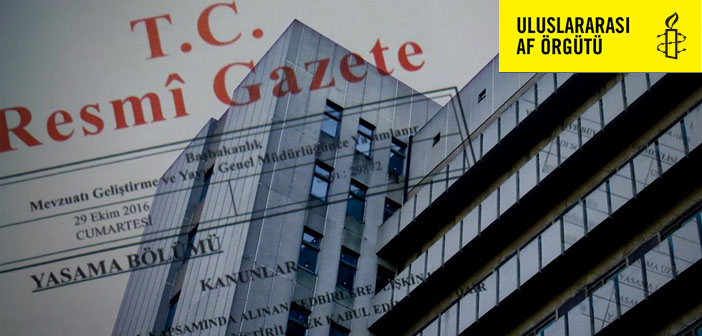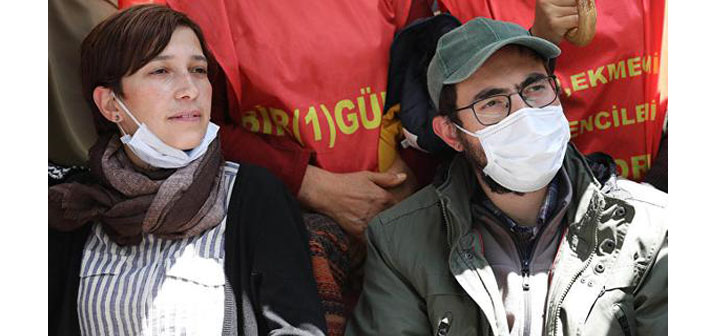Human Rights Watch (HRW), in a report released today, stated that there is torture and ill-treatment in police custody, since the key safeguards against torture and ill-treatment are excluded from the decrees that were issued after the coup attempt in July.
The
report titled as "A Blank Check: Turkey’s Post-Coup
Suspension of Safeguards Against Torture" consists of 47 pages
and reveals how the state of emergency decrees violate the rights of
the detainees.
The report includes details of 13 cases, where violations like stress positions, sleep deprivation, severe beating, sexual abuse and threat of rape.
Hugh Williamson, director of HRW Europe and Central Asia division, stated: “By removing safeguards against torture, the Turkish government effectively wrote a blank check to law enforcement agencies to torture and mistreat detainees as they like. The cases we have documented seem to indicate that some have done just that. Turkey’s government should reinstate these crucial safeguards now.”
During the research for issuing this report, HRW interviewed with more than 40 lawyers, human rights activists, former detainees, medical personnel and forensic specialists.
Testimonies
-A
lawyer from Ankara told how one of her clients, an officer
suspected of involvement in the failed coup, was treated in the
Ankara Security Directorate during interrogation:
"Several policemen
were standing behind him. He was sitting on a chair in front of a
table. To make him talk they whipped him with plastic strips that are
normally used as hand-cuffs and punched him with their fists in the
head and his upper body. He couldn’t do anything to protect himself
as he was hand-cuffed.
At some point I just
turned away. I don’t know how many times they hit him. I couldn’t
look at it anymore. I knew I couldn’t do anything to stop it. In
the end he gave a statement..."
-Eyüp Birinci told how he
had been treated in police custody in a statement given to the
prosecutor:
"My eyes were
blindfolded. I felt there were three or four people in the room. But
it was the police chief who detained me that spoke… 'Tell us what
you know, what’s your business in Antalya,' he said as they
stripped me naked… The police chief who detained me and whose name
I don’t know began to slap me in the face and eyes…They beat me
on the soles of my feet, on my stomach, then squeezed my testicles,
saying things like they’d castrate me… They made me lie face down
and twisted my left and right arms behind me… Then they turned me
on to my back, wet my feet and began to beat them. Then they beat
both arms with the baton. They wet my neck and beat me there….They
even put the baton in my mouth and rotated it….They made me stand
up and they punched me with fists. They punched my stomach for
several minutes, each time telling me to stand up straight."
-İ.B. wrote an account
for his lawyer of what had happened in police custody at the Vatan
Street Security Directorate from prison:
"Telling me I would
see a lawyer, they took me to interrogation every day for three days
(in Vatan). Pulling the clothes off me and tearing them, they
threatened me while squeezing my sexual organs and beating me in
disgusting ways. One said, I brought your mother here and if you
don’t talk I will rape her in front of you. They put a bag over my
head with my hands tied behind my back and laughed at me, hitting my
head on the ground and the wall, making me bend over and shouting,
'Is there no strong guy to rape this one!' They left marks of beating
all over my body… They cursed and kicked me, trying to get me to
say I knew people I’d never seen in my life and to admit a crime I
hadn’t committed and said they’d do a lot more to me if not and
would get seven or eight people to testify about me before a court so
I’d never get out of prison and if I didn’t accept and give names
they’d ruin my life. Every day I got a medical report mentioning
beating they would beat me again. They said, get whatever report you
like, everything’s in our hands."
Recommendations
Here are HRW's recommendations to Turkish government:
Immediately rescind the provisions of the emergency decrees that enable torture and ill-treatment and are inconsistent with the state’s fundamental obligations under international law. In particular:
Rescind the extension of police detention without judicial overview to 30 days;
Rescind the restriction on access to lawyer for up to five days;
Rescind the restriction on confidential communication between lawyers and detainees;
Lift the extensive restrictions on the right to choose a lawyer; any denial of the right to a lawyer of the detainees’ choosing should only be made by a judge providing substantiated reasons as to why the chosen lawyer cannot act as legal representative;
Rescind the protection of government officials from accountability when their actions are deemed to have been in the discharge of duties carried out in the context of the decrees.
Give detainees and lawyers immediate access to all medical examination reports and other information related to potential ill-treatment and torture and permit an examination by an independent doctor should the detainee or his or her lawyer request it;
Ensure that law enforcement agents do not interfere with medical examinations of detainees. Pursue disciplinary action against those who do;
Grant access to all police and gendarmerie detention centers and prison facilities for independent monitors, including the U.N. Special Rapporteur on Torture, bar association representatives, representatives of non-government human rights organizations, lawyers, and medical professionals;
Investigate promptly and impartially all allegations of torture or ill-treatment by security or law enforcement officials of any rank, and prosecute in line with international standards, any official found responsible for ordering, carrying out, or acquiescing in torture or ill-treatment;
Ensure that prosecutors investigate the responsibility of commanding officers where law enforcement officials are alleged to have perpetrated serious abuses. Commanding officers who know or should have known of such acts, and who fail to take action to prevent and punish them, should be included in prosecutors’ investigations and, where appropriate, face sanctions;
Ensure that effective and meaningful disciplinary sanctions are imposed on law enforcement officials who commit abuses;
Suspend from active duty officers under investigation for torture or ill-treatment and ensure their dismissal if convicted;
Allow the immediate publication of the conclusions and findings of the September 2016 ad hoc visit of the European Committee for the Prevention of Torture.
For reading the full report, click here





